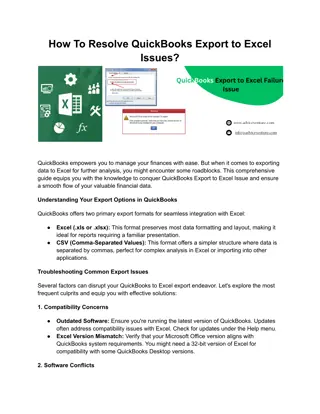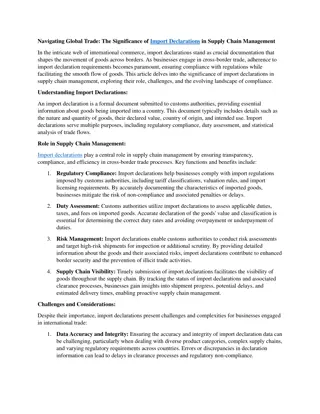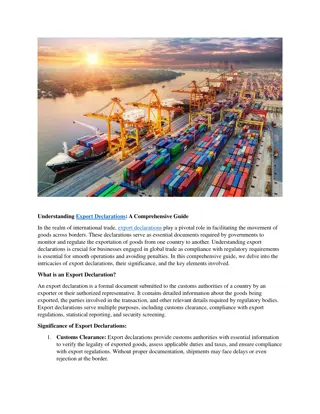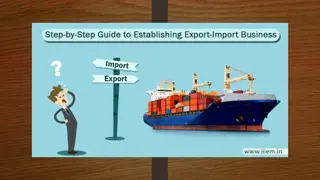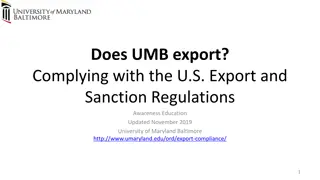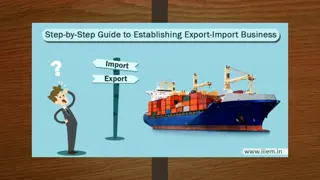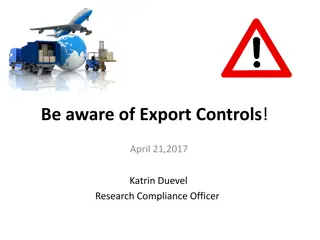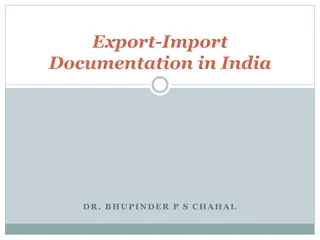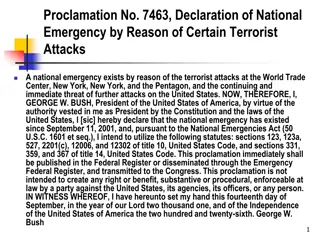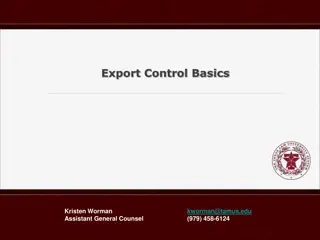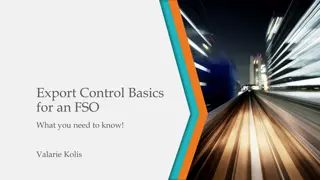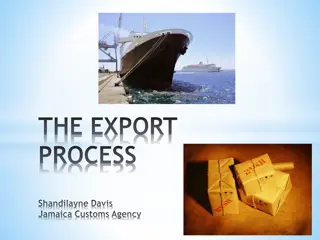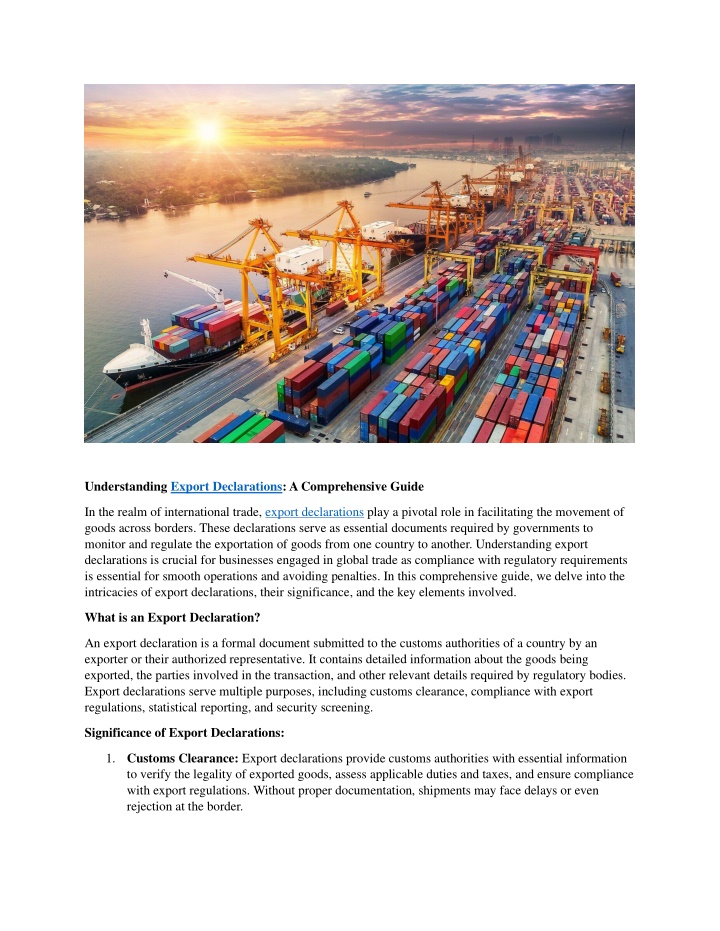
Understanding Export Declarations: A Comprehensive Guide
In the realm of international trade, export declarations play a pivotal role in facilitating the movement of goods across borders. These declarations serve as essential documents required by governments to monitor and regulate the exportation of goods from one country to another. Understanding export declarations is crucial for businesses engaged in global trade as compliance with regulatory requirements is essential for smooth operations and avoiding penalties. In this comprehensive guide, we delve into the intricacies of export declarations, their significance, and the key elements involved.
Download Presentation

Please find below an Image/Link to download the presentation.
The content on the website is provided AS IS for your information and personal use only. It may not be sold, licensed, or shared on other websites without obtaining consent from the author. If you encounter any issues during the download, it is possible that the publisher has removed the file from their server.
You are allowed to download the files provided on this website for personal or commercial use, subject to the condition that they are used lawfully. All files are the property of their respective owners.
The content on the website is provided AS IS for your information and personal use only. It may not be sold, licensed, or shared on other websites without obtaining consent from the author.
E N D
Presentation Transcript
Understanding Export Declarations: A Comprehensive Guide In the realm of international trade, export declarations play a pivotal role in facilitating the movement of goods across borders. These declarations serve as essential documents required by governments to monitor and regulate the exportation of goods from one country to another. Understanding export declarations is crucial for businesses engaged in global trade as compliance with regulatory requirements is essential for smooth operations and avoiding penalties. In this comprehensive guide, we delve into the intricacies of export declarations, their significance, and the key elements involved. What is an Export Declaration? An export declaration is a formal document submitted to the customs authorities of a country by an exporter or their authorized representative. It contains detailed information about the goods being exported, the parties involved in the transaction, and other relevant details required by regulatory bodies. Export declarations serve multiple purposes, including customs clearance, compliance with export regulations, statistical reporting, and security screening. Significance of Export Declarations: 1.Customs Clearance: Export declarations provide customs authorities with essential information to verify the legality of exported goods, assess applicable duties and taxes, and ensure compliance with export regulations. Without proper documentation, shipments may face delays or even rejection at the border.
2.Trade Statistics: Governments utilize export declaration data to compile trade statistics, track trends in international trade, and formulate trade policies. Accurate and timely reporting through export declarations contributes to the transparency and reliability of trade statistics. 3.Security Screening: Export declarations play a crucial role in enhancing security measures by allowing authorities to screen shipments for potential risks, such as illegal goods, prohibited items, or goods subject to export controls. Compliance with export declaration requirements helps prevent illicit activities and protects national security interests. 4.Export Controls and Regulatory Compliance: Many countries have export control regulations in place to regulate the exportation of sensitive goods, technologies, or dual-use items that could pose risks to national security or violate international agreements. Export declarations assist in ensuring compliance with these regulations by providing detailed information about the nature and destination of exported goods. Key Elements of Export Declarations: 1.Exporter Information: This includes the name, address, and contact details of the exporter or the exporting entity responsible for the shipment. 2.Consignee Information: Details of the party receiving the goods, including name, address, and contact information. In some cases, additional information such as the consignee's tax identification number or business registration number may be required. 3.Description of Goods: A comprehensive description of the goods being exported, including the quantity, weight, value, commodity code, and any applicable harmonized system (HS) code. 4.Export Documentation: Supporting documents such as commercial invoices, packing lists, certificates of origin, and export licenses may need to be submitted along with the export declaration, depending on the nature of the goods and destination country. 5.Transportation Details: Information regarding the mode of transportation, vessel or flight details, port of departure, and destination port. 6.Declaration of Value and Currency: Declaration of the value of the exported goods, along with the currency in which the transaction is conducted. 7.Regulatory Compliance: Declarations regarding compliance with export control regulations, sanctions, embargoes, or other regulatory requirements imposed by the exporting and importing countries. Types of Export Declarations: 1.Standard Export Declaration (SED): Also known as the Electronic Export Information (EEI) in the United States, SED is the most common form of export declaration used for shipments of goods valued above a certain threshold. It is typically submitted electronically through customs' designated systems. 2.Simplified Export Declaration: This type of declaration is used for low-value shipments or shipments of non-restricted goods, where less detailed information is required compared to a standard export declaration.
3.Exemption Declarations: Some countries offer exemptions or simplified procedures for certain types of goods or transactions, such as temporary exports, personal effects, or goods intended for repair or return. Conclusion: Export declarations play a critical role in international trade by facilitating customs clearance, ensuring regulatory compliance, and enhancing security measures. Businesses engaged in exporting goods must understand the importance of accurate and timely reporting through export declarations to avoid disruptions in supply chains, regulatory penalties, and reputational damage. By adhering to export declaration requirements and staying informed about evolving export regulations, exporters can navigate the complexities of international trade successfully and contribute to global economic growth and stability. If you want to get services related to export declarations, Customs Declarations UK is helpful for you in this competitive market. Author Profile: (David Hawk) David Hawk is an Expert in Customs Declarations Services having 7+ years of experience in this industry.




